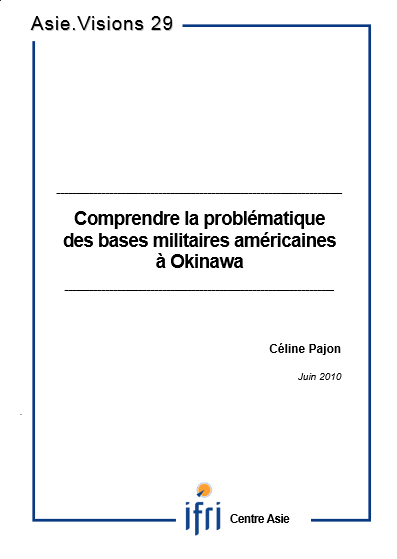Understanding the Issue of U.S. Military Bases in Okinawa

The failure of Prime Minister Hatoyama to transfer the dangerous U.S. military base of Futenma out of Okinawa hastened his resignation, announced on June 2nd.
The issue of U.S. bases in Okinawa is indeed particularly complex because it combines different logics and sometimes contradictory dynamics at three levels of governance. Internationally, the presence of American forces on its soil is a quid pro quo for US protection of Japan in the case of an attack. The bases are also key focal points of Washington's regional and global military presence. At the local level, the U.S. military presence has shaped the history, the territory, as well as the economic, social and cultural profile of Okinawa over the last sixty years. It also causes significant disturbances to local communities.
The management of these issues by the central government in Tokyo raises the question of its relationships with geographical and cultural fringe regions like Okinawa.
Download the full analysis
This page contains only a summary of our work. If you would like to have access to all the information from our research on the subject, you can download the full version in PDF format.
Understanding the Issue of U.S. Military Bases in Okinawa
Related centers and programs
Discover our other research centers and programsFind out more
Discover all our analyses
China’s Strategy Toward Pacific Island countries: Countering Taiwan and Western Influence
Over the past decade, China has deployed a diplomatic strategy toward the Pacific Island Countries (PICs). This strategy pursues two main objectives: countering Taiwan's diplomatic influence in the region and countering the influence of liberal democracies in what Beijing refers to as the "Global South."

Opening up the G7 to South Korea to Address Contemporary Global Challenges
The G7’s global influence has diminished as powers like China reshape international governance through initiatives such as BRICS and the Shanghai Cooperation Organisation (SCO). With the G7 now representing just 10 per cent of the world’s population and 28 per cent of global GDP, its relevance is increasingly questioned.
Expanding SPDMM as a pivotal institution in the Pacific – A French perspective
The South Pacific Defence Ministers’ Meeting (SPDMM) is the only forum that brings together defense ministers from the wider South Pacific — including Chile, which is hosting it for the first time. This heterogeneous group of countries with varying resources, capacities, and interests — Australia, Chile, Fiji, France, New Zealand, Papua New Guinea (PNG), and Tonga — are united by their shared determination to strengthen cooperation on maritime security and humanitarian assistance and disaster relief (HADR) activities.
EU’s Derisking From China: A Daunting Task
With economic security as a major concern, the EU has recently turned to “derisking” from China. The EU strategy entails reducing critical dependencies and vulnerabilities, including in EU supply chains, and diversifying where necessary, while recognizing the importance and need to maintain open channels of communication.












